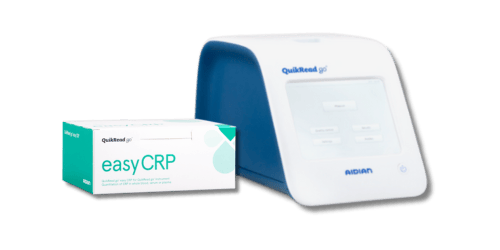
CRP Testing at the Point of Care in Paediatrics: A Focus on QuikRead go®
by Naomi Chant, Associate Director of Professional Diagnostics, Una Health
In the field of paediatrics, rapid and accurate diagnosis plays a crucial role in effective patient management. Early onset neonatal bacterial infection is a significant cause of mortality and morbidity in newborns. One valuable biomarker used to aid the detection of infections is C-reactive protein (CRP). The ability to quickly assess CRP levels can aid healthcare providers in detecting infections earlier and making informed decisions about patient care.
C-reactive protein (CRP) is an acute-phase protein that is produced by the liver in response to inflammation. Measurement of CRP levels enables clinicians to evaluate the presence and severity of inflammatory conditions, such as bacterial infections.
Traditional laboratory-based CRP testing can be time-consuming, leading to delays in diagnosis and subsequent treatment. The volume of blood generally needed for laboratory testing is around 0.3mL, which can be challenging from neonates. Repeated phlebotomy for laboratory testing is a main cause for anaemia in extremely low birth weight infants.1
Point-of-care testing (POCT) offers rapid results, enabling immediate clinical decision-making and ensuring timely treatment interventions for paediatric patients.
Assessment and Validation of QuikRead go in Paediatrics
The QuikRead go® system has proven to be a valuable tool for CRP testing in paediatric patients.
Hernández-Bou et al. compared the QuikRead go to their laboratory test. The study involved children with fever without source (FWS) and evaluated the optimal CRP cut-off to identify patients with a high risk of infection2. They found a high correlation between the QuikRead go and the laboratory test and provided reliable results to help rule out serious infection.
In another study, Billetop et al. compared the QuikRead wr-CRP test to their standard laboratory testing in babies with suspected infection. The wr-CRP (wide range CRP) assay measures 0.5-200mg/L CRP making it ideal for neonatal testing where highly sensitive testing for low levels of CRP are needed. The authors concluded the QuikRead wr-CRP assay provided reliable results compared to their laboratory method, providing a bedside alternative that required small blood volumes, ideal for a neonatal setting.

The QuikRead go system has several features making it suitable for neonate and paediatric testing:
- Small fingerprick sample volume (10µl)
- Suitable for all ages
- Wide haematocrit correction range (15-75%) compared to some other point-of-care tests. This allows for accurate measurements in cases of paediatric patients with varying haematocrit levels.
Furthermore, the simplicity of the QuikRead go system enables healthcare providers with varying levels of expertise to perform the test, making it accessible in diverse clinical settings.
Optimising Paediatric Care with QuikRead go
In the field of paediatrics, CRP testing at the point of care with devices like the QuikRead go analyser offers numerous benefits. Rapid and accurate diagnosis, enhanced haematocrit correction range, and user-friendly operation make it a valuable tool for healthcare providers in paediatric settings. Additionaly, published data strongly supports the performance of QuikRead Go, particularly in detecting serious bacterial infections in infants. By incorporating CRP testing at the point of care, clinicians can make well-informed decisions promptly leading to optimised patient care.
References and further reading:
- Clinical evaluation of point-of-care testing for wide-range C-reactive protein (wr-CRP) in neonates with suspected sepsis
- Evaluation of the bedside Quikread go® CRP test in the management of febrile infants at the emergency department – PubMed (nih.gov)

Discover QuikRead go®
The QuikRead go instrument is the new generation point-of-care system, designed to support diagnosis and treatment management in various types of healthcare settings, including paediatrics.
